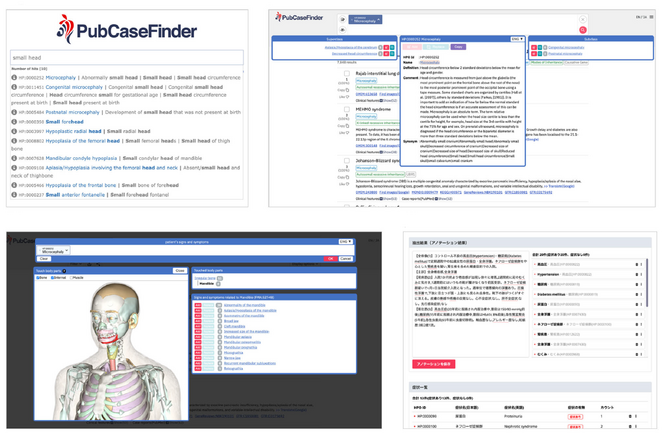Even medical professionals with years of experience can spend hours researching potential illnesses in reliable medical sources (such as databases, books, and literature) to identify which diseases have phenotypic traits overlapping with the phenotypes of undiagnosed patients.
 Research team upgraded clinical decision support system PubCaseFinder to provide better diagnosis with rare/genetic diseases. Image Credit: ©2022 Fujiwara et al. Human Mutation published by Wiley Periodicals LLC.
Research team upgraded clinical decision support system PubCaseFinder to provide better diagnosis with rare/genetic diseases. Image Credit: ©2022 Fujiwara et al. Human Mutation published by Wiley Periodicals LLC.
Phenotypes are a patient’s symptoms and physical characteristics. While next-generation sequencing technology, which uses massively parallel sequencing to discover the candidate genes causing the disease, can diagnose 50% of undiagnosed patients, finding a single gene that explains an undiagnosed patient’s symptoms takes a lot of effort.
To address these issues, the researchers created PubCaseFinder, a clinical decision support system, which, based on phenotypic similarity, produces prioritized lists of 7848 genetic disorders, 3619 uncommon diseases, and 4025 causal genes.
Because their phenotypes closely resemble the query phenotypes used as input, the top-listed diseases and their causal genes indicate the differential diagnosis that is most likely to be made. Phenotypic similarities are calculated by PubCaseFinder using the match-making algorithm GeneYenta.
The group also created a PubCaseFinder querying Matchmaker Exchange application programming interface. The Matchmaker Exchange is an international cooperative initiative that was started in 2013 to offer a platform where case repositories and healthcare practitioners could share case information and match related cases using application programming interfaces and use them for diagnosis.
Since its widespread adoption in 2017, which helped the Matchmaker Exchange initiative, PubCaseFinder has seen an annual growth in the number of queries.
The researchers’ most recent work has significantly improved PubCaseFinder and the application programming interface. With the new PubCaseFinder, medical professionals can filter ranking lists using causal genes, modes of inheritance, and illness nomenclature to provide a more accurate record of the patient's phenotypic anomalies.
Updates have been made to the prior GeneYenta matching algorithm, which was not reliable when users incorrectly specified a patient’s phenotype. The revised GeneYenta matching algorithm has enhanced PubCaseFinder’s automatic differential diagnosis performance.
Additionally, the researchers have added an automatic update system to PubCaseFinder in order to keep the resources updated. The application programming interface, the GeneYenta matching algorithm, and PubCaseFinder’s most recent updates will increase the resources’ accessibility for case repositories and medical specialists.
We believe that these updates will contribute to improving rare/genetic disease diagnostic rates.”
Toyofumi Fujiwara, Researcher, Research Organization of Information and Systems
PubCaseFinder is already available in Japanese and English. In the future, the researchers would like to make its availability in other languages like Chinese and Korean.
In addition, we would like to share Japanese case information that has not yet been shared on the Matchmaker Exchange project. For this purpose, we will develop a case information management function which will enable users to upload their own information to PubCaseFinder. The goal is to make it easy to share case information worldwide through PubCaseFinder.”
Toyofumi Fujiwara, Researcher, Research Organization of Information and Systems
Source:
Journal reference:
Fujiwara, T., et al. (2022) Advances in the development of PubCaseFinder, including the new application programming interface and matching algorithm. Human Mutation. doi.org/10.1002/humu.24341.